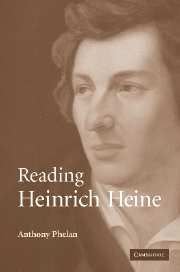Book contents
- Frontmatter
- Contents
- Acknowledgements
- Introduction
- PART I THE BIOGRAPHICAL IMPERATIVE
- 1 The biographical imperative: Karl Kraus
- 2 The biographical imperative: Theodor Adorno
- 3 The biographical imperative: Helmut Heißenbüttel – pro domo
- 4 From the private life of Everyman: self-presentation and authenticity in Buch der Lieder
- 5 In the diplomatic sense: reading Reisebilder
- PART II THE REAL HEINE
- PART III PARISIAN WRITING
- PART IV EPILOGUE
- Notes
- Bibliography
- Index
3 - The biographical imperative: Helmut Heißenbüttel – pro domo
Published online by Cambridge University Press: 22 September 2009
- Frontmatter
- Contents
- Acknowledgements
- Introduction
- PART I THE BIOGRAPHICAL IMPERATIVE
- 1 The biographical imperative: Karl Kraus
- 2 The biographical imperative: Theodor Adorno
- 3 The biographical imperative: Helmut Heißenbüttel – pro domo
- 4 From the private life of Everyman: self-presentation and authenticity in Buch der Lieder
- 5 In the diplomatic sense: reading Reisebilder
- PART II THE REAL HEINE
- PART III PARISIAN WRITING
- PART IV EPILOGUE
- Notes
- Bibliography
- Index
Summary
… bei solchem Streit
Verliert man seine Ähnlichkeit.
… after such pugnacity
You lose your selfsame similarity.
(Wilhelm Busch)Karl Kraus's critique and Adorno's talk taking up and extending its themes are the most important texts in the public debates about Heine in the first half of the twentieth century. An unusual and provocative coda to their arguments was provided by Helmut Heißenbüttel in two essays published a decade apart. Until his death in 1996 Heißenbüttel was one of the leading figures in the experimentalist avant-garde of the former West Germany. His essays ‘Materialismus und Phantasmagorie in Gedicht’ (‘Materialism and Phantasmagoria in the Poem’ (1972)) and ‘Karl Kraus und die Folgen’ (‘Karl Kraus and the Consequences. Heinrich Heine as a Journalist’(1982, broadcast on South German Radio in 1979)) set out to throw new light on the views of Kraus and Adorno, and to reinterpret them. Heißenbüttel understands perfectly well the political and economic framework of Kraus's polemic and Adorno's manipulation of its arguments. His strategy, however, inverts their assessment in order to claim that Heine achieved a fundamental change of direction in post-Romantic aesthetics. The suggestion is not new in itself: academic criticism had long applied categories of ‘belatedness’, of the epigonic, and of the transitional to Heine's work. Heißenbüttel has an independent and intriguing view of Heine's novelty which confirms the major themes in the literary understanding of his work which have emerged in the work of Kraus and Adorno, but gives an original inflection to his importance as a modern poet.
- Type
- Chapter
- Information
- Reading Heinrich Heine , pp. 33 - 45Publisher: Cambridge University PressPrint publication year: 2007

